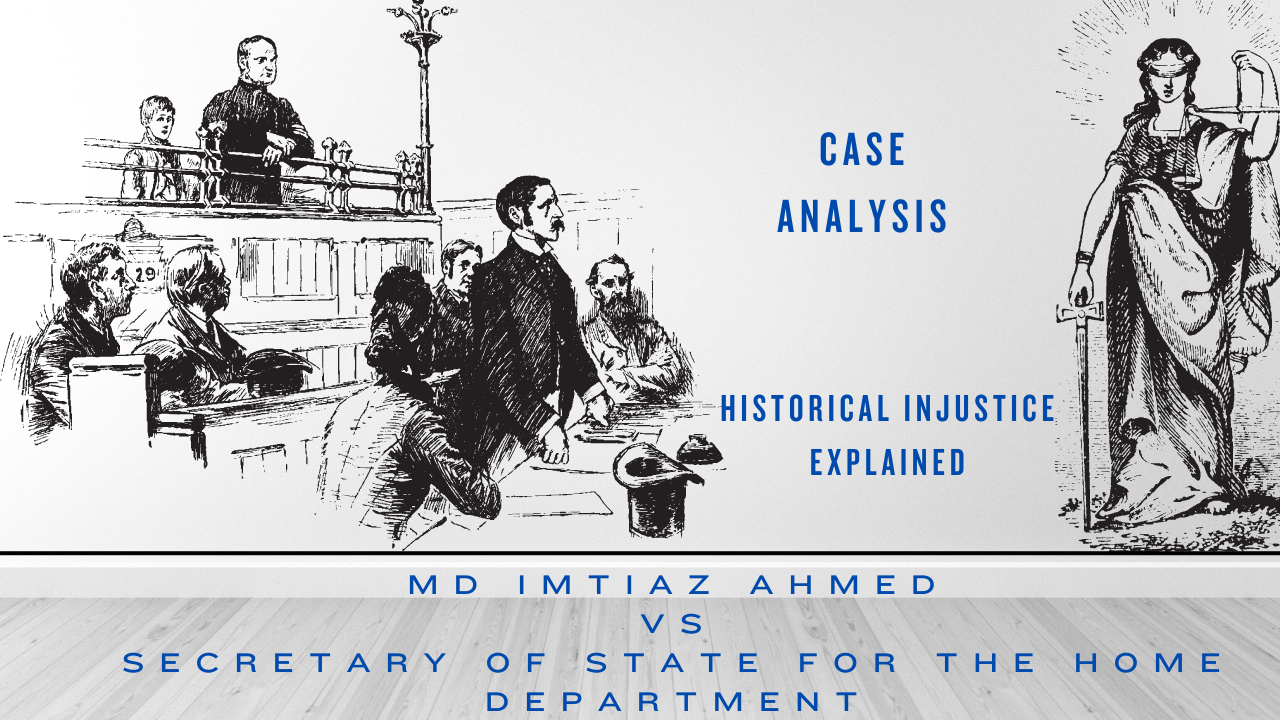The appellant, a citizen of Bangladesh, arrived in the UK as a student in August 2008 and remained in the UK without valid leave after his leave expired on 19 March 2016.
He argues that his removal from the UK would breach Article 8 of the ECHR. He claims that an injustice occurred on 15 September 2016 when his application for a residence card under the EEA Regulations was refused without an opportunity to appeal. However, the Judge of the First-tier Tribunal Peer dismissed this argument in a decision dated 3 October 2022.
Background:
The appellant arrived in the UK in 2008 and had several extensions of his leave. His last period of leave was from 28 November 2013 to 19 March 2016. He applied for a residence card under the EEA Regulations on 17 March 2016, which was rejected on 15 September 2016. He was informed he had no right to appeal, but he appealed anyway. This appeal was dismissed on 8 December 2016. He then started judicial review proceedings, which were ultimately unsuccessful.
In November 2017, the Court of Appeal overturned the decision in Khan v Secretary of State, establishing that extended family members have a right to appeal.
The appellant applied for asylum in April 2018, which was refused, and subsequently applied for leave based on 10 years of continuous lawful residence in June 2019, which was also refused.
First-tier Tribunal Decision:
The main issues before the First-tier Tribunal were the appellant’s arguments regarding the public interest in effective immigration controls and the historical injustice he suffered due to the refusal of his appeal rights.
The judge rejected both arguments:
- The appellant’s claim of being treated differently under the Immigration Rules due to the 2016 decision was dismissed.
- The judge found no historical injustice because The 2016 decision was in line with the understanding at the time, given the Sala judgment. The appellant’s EEA appeal had no prospect of succeeding based on the evidence. The appellant could have sought a fresh decision with a right of appeal after the law was clarified in Khan.
Grounds of Appeal at the Upper Tribunal:
The appellant raised four grounds of appeal:
- The 2016 decision did not comply with the Notices Regulations. Highlighted ‘historical injustice’.
- The judge did not adequately consider the evidence of the appellant’s chance of success in an appeal.
- The judge wrongly considered the 2016 decision as correct due to the Sala judgment.
- The judge’s proportionality assessment under Article 8 was based on incorrect premises due to the first three grounds.
So what is Historical Injustice:
The judge states that “Historical injustice” arises when an individual suffers due to the wrongful operation (or non-operation) of the Secretary of State’s immigration functions. This includes failures to apply relevant immigration policies, delays due to system dysfunction, or mistaken views by the Secretary of State leading to adverse immigration decisions. In doing so he referred to the following cases.
In Patel (historic injustice; NIAA Part 5A) [2020] UKUT 351(IAC), the appellant contended that an injustice was done to her when her employer declined to support an extension of her leave as a highly skilled worker. However, the Presidential Panel dismissed her claim, determining that the perceived injustice was due to her employer’s actions and not the respondent’s. The Panel distinguished “historic injustice,” which is confined to specific cases recognised by the UK government for wrongful treatment, and “historical injustice,” which was pertinent to the appellant’s argument.
The discussion on determining historical injustice is grounded in the specific facts of each case, primarily within the legal framework of Article 8. To establish a wrongful operation of immigration functions, there must be a clear causal connection between the wrongful operation and the prejudice suffered by the appellant.
The appellant’s claim was based on the respondent’s alleged failure to comply with the Notices Regulations in the 2016 decision by not providing information about the appellant’s right to appeal. However, the law at the time of the 2016 decision, as understood by the Sala authority, stipulated that there was no right of appeal. Therefore, the respondent’s decision was consistent with the prevailing law.
In Hysaj (Deprivation of Citizenship: Delay) [2020] UKUT 00128 (IAC); [2020] Imm AR 1044, it was highlighted that even if the law is later found to be incorrect, the respondent is entitled to rely on the state of the law known to her at the time of the decision.
Marepally v Secretary of State for the Home Department [2022] EWCA Civ 855; [2022] Imm AR 1341 emphasised that a notice lacking information about the right of appeal does not necessarily render the notice legally ineffective. An appellant must demonstrate that they suffered as a result of not being notified of their right to appeal.
The following general observations were made by the Honourable Mr Justice Dove:
a. Historical injustice is not established if an appellant cannot prove wrongful operation by the immigration authority. Mere actions by the authority, falling short of a public law error, are unlikely to be considered wrongful.
b. If the immigration authority’s decision aligns with existing case law at the time but is later overturned, it is not considered a wrongful operation.
c. To claim historical injustice, an appellant must prove not only a wrongful operation by the immigration authority but also demonstrate that they suffered as a result. A denied right of appeal is not wrongful if the appellant cannot prove a reasonable chance of succeeding in the appeal.
d. If an appellant could have earlier challenged a public law error or taken steps to mitigate claimed prejudice without a valid reason, this should be considered when determining the extent to which public interest in effective immigration controls should be reduced. Blaming a legal advisor is generally not a valid excuse, as highlighted in Mansur [2018] UKUT 274 (IAC).
The appeal was dismissed.
This case highlights the complexities of “historical injustice” claims in immigration law, especially regarding Article 8 of the ECHR. The appellant argued against the denial of his appeal rights after his residence card application was rejected in 2016. The court’s decision stressed the need for a clear link between the immigration authority’s error and the appellant’s harm.
The judge’s distinction between “historic injustice” and “historical injustice” is crucial. “Historic injustice” is about specific cases recognized by the UK government, while “historical injustice” covers broader wrongs due to the immigration authority’s mistakes. This distinction can guide lawyers in building stronger arguments and assessing the potential success of their client’s claims.
The case offers practical advice for lawyers. It emphasizes that mere mistakes by the immigration authority aren’t enough for a claim. Also, if the immigration authority’s decision follows existing laws but is later changed, it’s not seen as a mistake.
Lawyers need to prove not only that the immigration authority made an error but also that their client suffered because of it. This shows the importance of gathering strong evidence to support the claim of historical injustice.
In summary, this case provides valuable insights for lawyers dealing with “historical injustice” claims. By understanding the judge’s distinctions and principles, lawyers can better prepare their cases, assess their chances, and represent their clients more effectively.
#HistoricalInjustice #ImmigrationLaw #CaseStudy #LegalPrecedents #LawyerTips #ImmigrationRights



